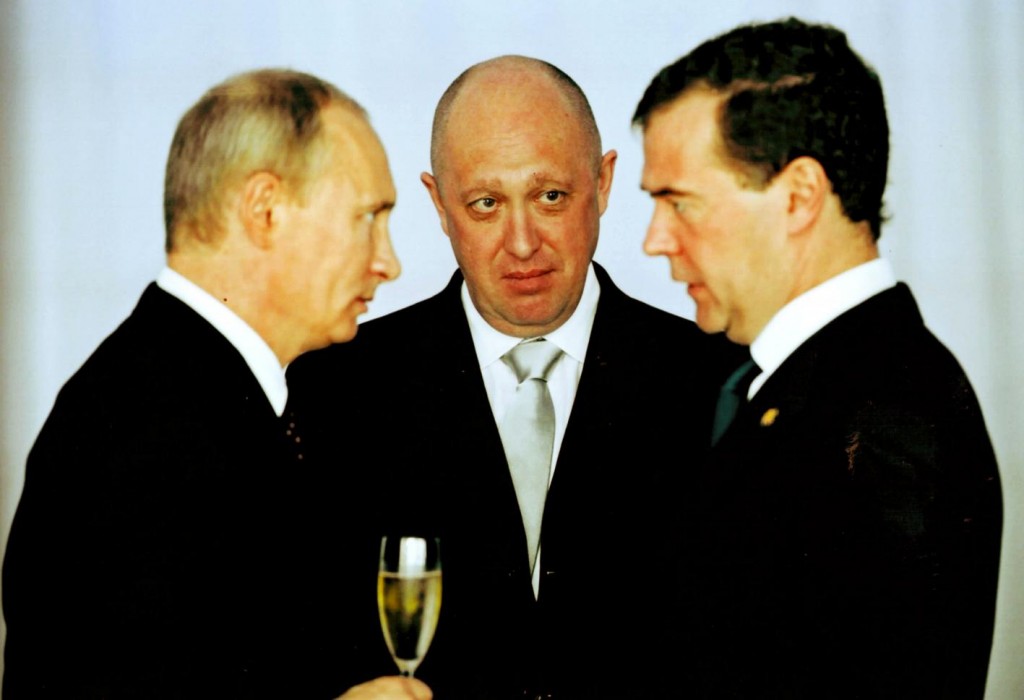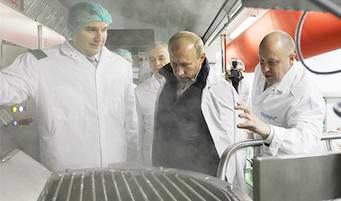Eugene Prigozhin is very popular with Russian media. It is very easy to find his photos in the company of the President Vladimir Putin. Russian newspapers often call Eugene Prigozhin “Putin’s personal cook”. He is not just a cook though, but rather one of the most powerful restaurateurs and caterers of Russia, who is close to Putin and often involved in organizing President’s meals and entertaining his important guests.
Today Eugene Prigozhin is mostly known as a caterer for the Russian army.
Until 2010, the Russian army took care of feeding military inside its ranks: some draftees were sent to cooking schools and careless soldiers were peeling potatoes in the kitchen as a form of punishment. But within the framework of the reform of Russian army, decision was made to outsource the provision of meals. Many catering firms were engaged in the fulfillment of the task.
In 2013 though, 92% of the army catering was passed to companies affiliated with Prigozhin owned Сonсord Management and Consulting company. Only 8% of the business was left to Eugene Prigozhin’s competitors, who were shocked by unexpected decision of the army bosses to take away from them their successful businesses.
RBE Group, back then the biggest catering company in Eastern Europe and the biggest competitor of Concord, according to Russian FORBES lost business that was giving the company $60 million in profits annually and was forced to fire 32.000 workers. The competitors tried to defend themselves, but in vain. Eugene Prigozhin got nickname: “untouchable” and received from the Russian state 92 billion rubles (about $3 billion) to finance his catering for the army.
How Eugene Prigozhin got to this powerful position?
Eugene Prigozhin graduated from a St. Petersburg sporting boarding school, where he specialized in cross-country skiing. Then he graduated from the Pharmaceutical Institute but preferred to make his living working as a skiing instructor. It wasn’t his only occupation though.
In 1979 he was given a suspended sentence with the verdict “theft”. Two years later he was sentenced for a real term under more serious articles of the Criminal Code. In 1988, Prigozhin was pardoned and in 1990 he got out of the prison colony.
It was the time of Perestroika, when private business became legal in Russia.
Eugene joined business of his stepfather, who organized a chain to sale hot dogs, first in the history of Leningrad. One day he met Boris Spektor, a former sport school classmate. Spector was developing casinos and grocery stores and he asked Prigozhin to become the manager of the first in Russia private network of grocery stores named Contrast. The network then enjoyed wide popularity. Unlike the government stores, Contrast had a great choice of products and the customers were coming from all over the city. In 1993 Cyril Ziminov, an experienced sales manager, became commercial director of the network, while Prigozhin remained responsible for the company’s finances. Both were given 15% of shares of Contrast. Ziminov and Prigozhin became close friends, they bought apartments on the same landing of an apartment building and for eight years they were arriving to work together in one car.
With time partners became owners of the several top chic restaurants in St. Petersburg and Moscow.
In 1998 the partners opened their first restaurant on a boat called New Island n St. Petersburg. On this boat they served President Yeltsin and Prince Albert II of Monaco for whom Prigozhin personally cooked dumplings stuffed with vodka and a sorbet of yellow tomatoes.
In summer 2001, Putin invited French President Jacques Chirac to the New Island for ride and dinner. Chirac wanted to hear something about the buildings of St. Petersburg, which sailed past the ship, and there was no guide on board. The situation was saved by Ziminov, who gave a short tour.
Prigozhin personally served presidents.
“Vladimir Putin saw I did not mind personally bringing plates to crowned persons, since I considered them to be my personal guests”, – said Prigozhin, explaining his entrepreneurial know-how in his only interview, given to St. Petersburg magazine City 812.
In May 2002 Putin and George W. Bush dined on board the New Island. The presidents’ menu consisted of foie gras and gingerbread, served with prunes and caramel made of aged port wine, caviar on ice, grilled beef fillet with black truffles, served with fresh morels and baby carrots, cooked in a broth of mountain ash.
Finally, in autumn 2003, Putin celebrated his birthday on the New Island.
Prigozhin quickly became a part of Putin’s close circle. A good storyteller, charming and cheerful, he became something of a royal jester at the President’s receptions.
In October 2009 Prigozhin opened an elite private restaurant on the 12th floor of the government building, named White House. He was treating government members to delicacies on the cheap.
After establishing himself as one of the members of the Putin’s circle Prigozhin got rid of his long time partners. Mikhail Mirilishvily, an investor who controlled Spector’s businesses, fought to save his investment. Finally he was arrested as a “kidnapper” and sentenced to imprisonment.
The Prigozhin’s close friend Ziminov agreed to give up his share in two restaurant companies, where they were partners, for one million dollars. Prigozhin gave him $ 600,000, and promised to pay additional $400,000 “in a reasonable time.” However, in a year, which took place after Ziminov stepped away from management, these two companies have been liquidated. Then there was a law, by which a company operating without cash registers, could be closed. The companies disappeared and Ziminov never got his $400,000.
Then Prigozhin started big business operations.
In 2007, federal officials, involved in the National Education Project set about improving catering in educational institutions in fourteen of the country’s regions. They decided to introduce so-called “innovative on-board lunches” for Russian schoolchildren. In April 2008, a tender to provide “on-board meals” for 85 schools that had no canteens of their own was announced in St. Petersburg. There was immediate talk among market participants that the winner would be none other than Сonсord Management and Consulting. There was a lot of envy because the budgets of St. Petersburg allocated almost two billion rubles a year for school meals, a sum that attracted many suppliers. The monthly turnover for the winner would be at least 100-150 million rubles. Concord started by providing high school canteens in St. Petersburg with frozen lunches.
Then, in spite of protests of parents, Concord took control of feeding Moscow children.
Now Russian army, in order to accept Concord’s services, changed its rule, which demanded to feed solders only with fresh food. Vladimir Pavlov, the head of the Voentorg organization making all the army supplies deals, explained this decision:
“One cannot stop progress. For example, in the West all senior citizens switched to frozen food. It’s fast and convenient.”



